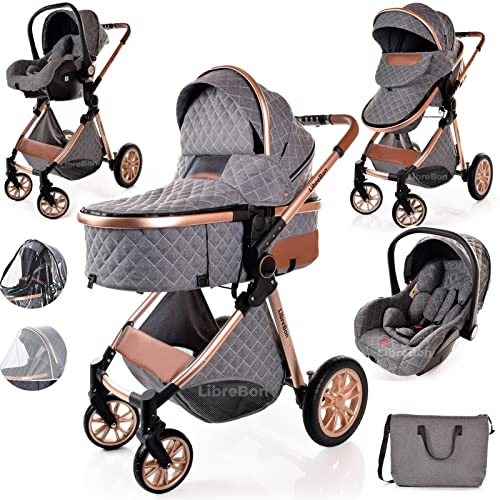Pram Or Pushchair Tips From The Top In The Business
페이지 정보
작성자 Justina Genders 작성일 25-09-09 23:00 조회 3 댓글 0본문
Pram or Pushchair: A Comprehensive Guide for New Parents
Picking the best mode of transport for kids is one of the first considerable decisions new parents deal with. With numerous alternatives on the market, the argument in between prams and pushchairs can be overwelming. This short article will provide comprehensive insights into the differences between prams and pushchairs, their specs, benefits and drawbacks, and what to consider before making a purchase.
Comprehending Prams and Pushchairs
At its core, the option in between a pram store near me and a pushchair lies in their style and intended use.
Meanings:
Pram: A pram, short for "perambulator," is designed mostly for newborns. It features a flat, carrycot-style seat that allows the baby to rest totally flat. Prams are frequently more elegant and are planned for carrying babies who are not yet staying up individually.
Pushchair: A pushchair, likewise known as a stroller, is developed for older infants and young children who can sit up. Pushchairs normally have an upright seat and may not recline completely flat, although lots of designs now use adjustable reclining alternatives for comfort.
Secret Differences:
| Feature | Pram | Pushchair |
|---|---|---|
| Age of Use | Newborn to about 6 months | 6 months to 4 years or more |
| Seating Position | Flat, lying down | Upright or slightly reclined |
| Weight | Normally much heavier | Usually lighter |
| Mobility | Less portable due to weight | More portable and easier to fold |
| Usage Case | Short strolls, leisurely strolls | Daily use, errands, longer outings |
Benefits and Disadvantages
Pram
Advantages:
- Comfort for Newborns: Provides a flat surface favorable to a newborn's developmental needs.
- Stylish Designs: Many Sale prams; date.com.ng, included stylish styles, providing a touch of luxury.
- Storage Space: Sometimes consist of bigger storage choices below.
Disadvantages:
- Weight: Generally heavier and bulkier than pushchairs.
- Restricted Usage: Suitable just for newborns and babies who can not sit up.
Pushchair
Benefits:
- Versatility: Suitable for older babies and young children, frequently accommodating them for several years.
- Light-weight and Portable: Easier to fold and transport, making them ideal for busy parents.
- Configurable Options: Many pushchairs have adjustable seats and attachments for safety seat and carrycots.
Drawbacks:
- Comfort for Newborns: Not constantly appropriate for infants in the early months without a proper insert.
- Less Luxurious: Often perceived as less glamorous compared to prams.
Making the Right Choice
When it concerns deciding between a pram and pushchair, several elements should be thought about:
1. Lifestyle:
- If parents often make long trips or opt for strolls, a pram uk might be preferential.
- If they require to browse through city streets or take public transportation, a lightweight pushchair might be more ideal.
2. Budget plan:
Pricing can vary widely. Understanding your financial limitations will help focus on choices that fulfill both aesthetic and practical requirements.
3. Adaptability:
Some progressive options consist of travel systems that enable parents to shift from a safety seat to a pushchair with the exact same base, offering optimum versatility.
4. Storage Space:
A pram might use up more space in an automobile or at home, while a pushchair's ability to fold down can be a considerable advantage in tighter areas.

FAQs
Q1: Can I utilize a pushchair for newborns?
A1: Some pushchairs come with bassinet attachments or fully reclining seats, making them appropriate for newborns. Nevertheless, it's necessary to check the requirements before usage.
Q2: How do I choose the right design?
A2: Consider your way of life, budget plan, and the functions you prioritize, such as weight, portability, and storage choices.
Q3: Are prams and pushchairs safe for my baby?
A3: Yes, both prams and pushchairs are designed with safety features. Try to find designs with a 5-point harness, tough brakes, and safe frames.
Q4: How long can I use a pram for?
A4: A pram is typically appropriate until a baby can stay up unassisted, normally around 6 months.
Q5: What are travel systems?
A5: Travel systems are combinations of an automobile seat and a pushchair that operate in tandem, permitting easy transitions from cars and truck to pushchair without requiring to eliminate the baby.
Picking in between a pram and a pushchair eventually comes down to the needs and lifestyle preferences of each family. Prams offer convenience and style for infants, while pushchairs offer versatility and ease for older babies and toddlers. By thoroughly considering individual scenarios and requirements, moms and dads can make an educated option that will ensure safe and satisfying getaways with their kids.
In the end, whether one go with a stylish pram or a practical pushchair, the primary objective remains the exact same-- guaranteeing convenience and security for the child while facilitating benefit for parents.
- 이전글 10 Things Everybody Hates About Sash Window Refurbishment Sash Window Refurbishment
- 다음글 The largest Drawback in Disulfiram Comes Right down to This Word That Starts With "W"
댓글목록 0
등록된 댓글이 없습니다.



